
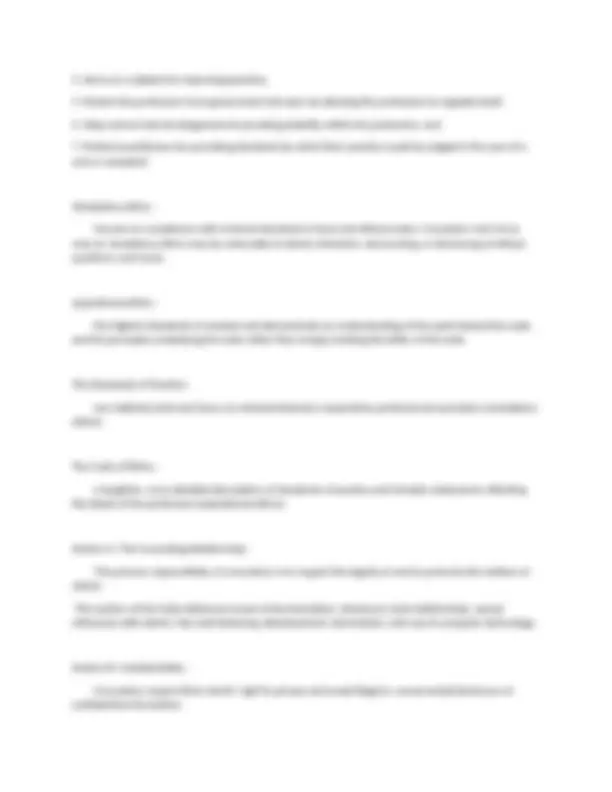
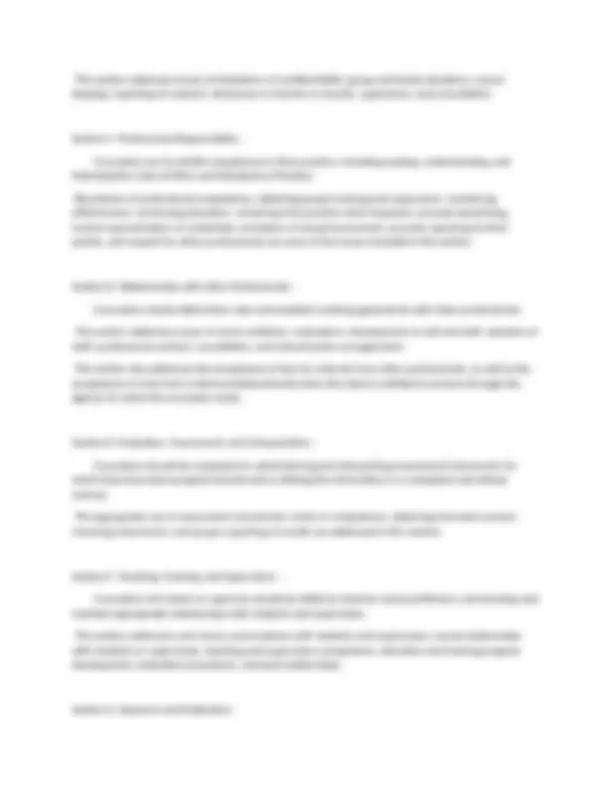
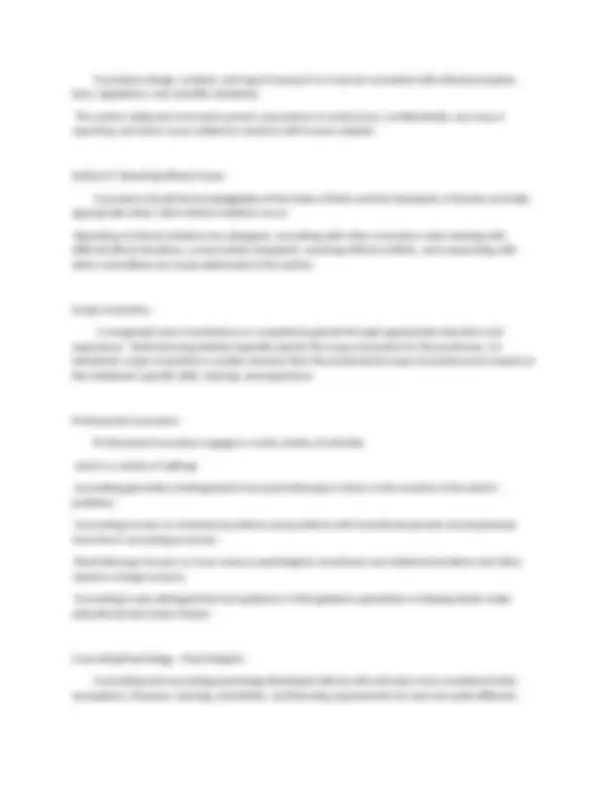
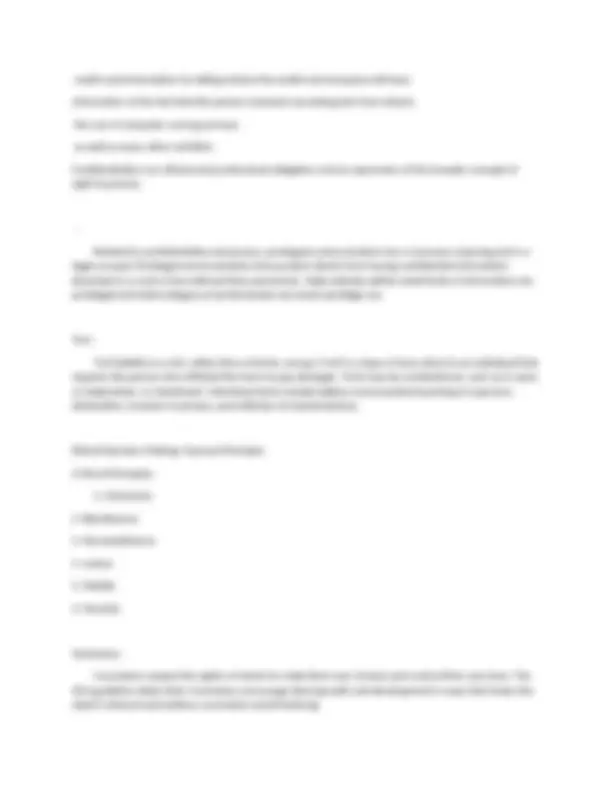
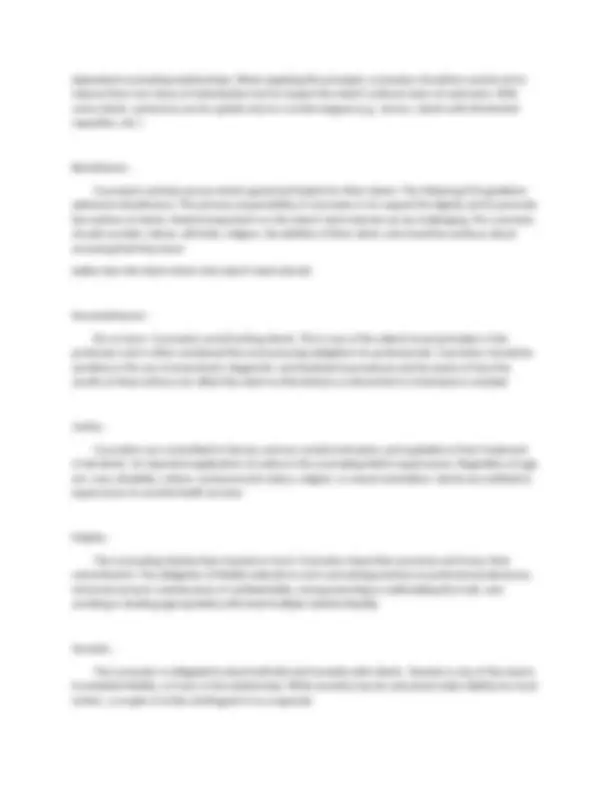
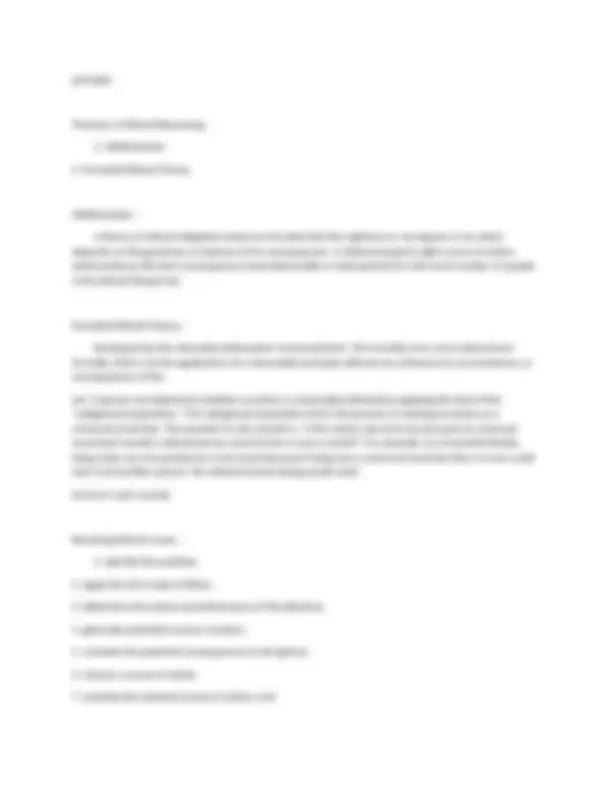


Study with the several resources on Docsity

Earn points by helping other students or get them with a premium plan


Prepare for your exams
Study with the several resources on Docsity

Earn points to download
Earn points by helping other students or get them with a premium plan
Community
Ask the community for help and clear up your study doubts
Discover the best universities in your country according to Docsity users
Free resources
Download our free guides on studying techniques, anxiety management strategies, and thesis advice from Docsity tutors
An overview of the history, professional organizations, certification, licensure, codes of ethics, and standards of practice for professional counselors. It also covers the scope of practice for counselors, as well as the differences between counseling and psychotherapy. The document also discusses the Buckley Amendment and the Individuals with Disabilities Education Act, as well as theories of ethical reasoning. Finally, it covers professional negligence and privacy issues.
Typology: Exams
1 / 11

This page cannot be seen from the preview
Don't miss anything!







Parson - roots in counseling profession through vocational guidance book: Choosing a vocation side note: During World War I, the U.S. Army asked psychologists to develop assessment devices to screen out unfit draftees, to place draftees in appropriate jobs, and to select qualified persons for officer training Super - replaced vocational guidance with counseling psychology Professional Organizations -
Normally, certifications are given by professional organizations, though states or training facilities may also offer certifications. Currently, the NBCC offers certification in six specialized areas:
This section addresses issues of limitations of confidentiality, group and family situations, record keeping, reporting of research, disclosure or transfer of records, supervision, and consultation. Section C: Professional Responsibility - Counselors are to exhibit competence in their practice, including reading, understanding, and following the Code of Ethics and Standards of Practice. Boundaries of professional competence, obtaining proper training and supervision, monitoring effectiveness, continuing education, refraining from practice when impaired, accurate advertising, honest representation of credentials, avoidance of sexual harassment, accurate reporting to third parties, and respect for other professionals are some of the issues included in this section. Section D: Relationships with other Professionals - Counselors clearly define their roles and establish working agreements with other professionals. This section addresses issues of work conditions, evaluations, development of self and staff, selection of staff, professional conduct, consultation, and subcontractor arrangements. This section also addresses the acceptance of fees for referrals from other professionals, as well as the acceptance of a fee from a client privately/directly when the client is entitled to services through the agency for which the counselor works. Section E: Evaluation, Assessment, and Interpretation - Counselors should be competent in administering and interpreting assessment instruments for which they have been properly trained and in utilizing the information in a competent and ethical manner. The appropriate use of assessment instruments, limits of competence, obtaining informed consent, choosing instruments, and proper reporting of results are addressed in this section. Section F: Teaching, Training, and Supervision - Counselors who teach or supervise should be skilled as teachers and practitioners, and develop and maintain appropriate relationships with students and supervisees. This section addresses such issues as boundaries with students and supervisees, sexual relationships with students or supervisees, teaching and supervision competence, education and training program development, evaluation procedures, and dual relationships. Section G: Research and Publication -
Counselors design, conduct, and report research in a manner consistent with ethical principles, laws, regulations, and scientific standards. This section addresses informed consent, precautions to avoid injury, confidentiality, accuracy in reporting, and other issues related to research with human subjects. Section H: Resolving Ethical Issues - Counselors should be knowledgeable of the Code of Ethics and the Standards of Practice and take appropriate action when ethical violations occur. Reporting of ethical violations by colleagues, consulting with other counselors when dealing with difficult ethical situations, unwarranted complaints, resolving ethical conflicts, and cooperating with ethics committees are issues addressed in this section. Scope of practice - "a recognized area of proficiency or competence gained through appropriate education and experience". State licensing statutes typically specify the scope of practice for the profession. An individual's scope of practice is usually narrower than the professional scope of practice and is based on the individual's specific skills, training, and experience Professional Counselors - Professional Counselors engage in a wide variety of activities work in a variety of settings counseling generally is distinguished from psychotherapy in terms of the severity of the client's problems Counseling focuses on situational problems and problems with transitional periods and emphasizes short-term counseling processes Psychotherapy focuses on more serious psychological, emotional, and relational problems and often requires a longer process. Counseling is also distinguished from guidance in that guidance specializes in helping clients make educational and career choices Counseling Psychology ~ Psychologists - Counseling and counseling psychology developed side-by-side and were once considered sister occupations. However, training, orientation, and licensing requirements for each are quite different.
Buckley Amendment Family Educational Rights and Privacy Act of 1974 (FERPA, Public Law 93-380) - gives parents of minors as well as students 18 yrs. old or older two rights: 1) access to educational records kept by the institution, and 2) prevention of the institution from releasing information to a third party (other than another school) without written consent. Parents or guardians of dependent students can be given copies of the students' records without the student's consent. While written consent is not required in the case of transferring a student's record to another educational institution, parents must be notified and must be given copies if they desire them Individuals with Disabilities Education Act (IDEA) (Public Law 94-142; PL 94-142) - Originally called the Education for All Handicapped Children Act, it was renamed in 1990 and revised in 1997. The law requires educational institutions to provide the least restrictive environment possible to all students regardless of the nature and degree of their handicap. School counselors should be aware of the federal guidelines that apply Professional negligence - occurs when the counselor departs from ordinary practice or fails to exercise due care. The most frequent allegations of malpractice involve violations of confidentiality, sexual misconduct, failure to prevent suicide, and other allegations of incompetent treatment To succeed in a malpractice claim, these four elements must be present:
credit card information for billing (where the credit card company will have information of the fact that the person received counseling and from whom), the use of computer scoring services, as well as many other activities Confidentiality is an ethical and professional obligation and an expression of this broader concept of right to privacy.
principle. Theories of Ethical Reasoning -